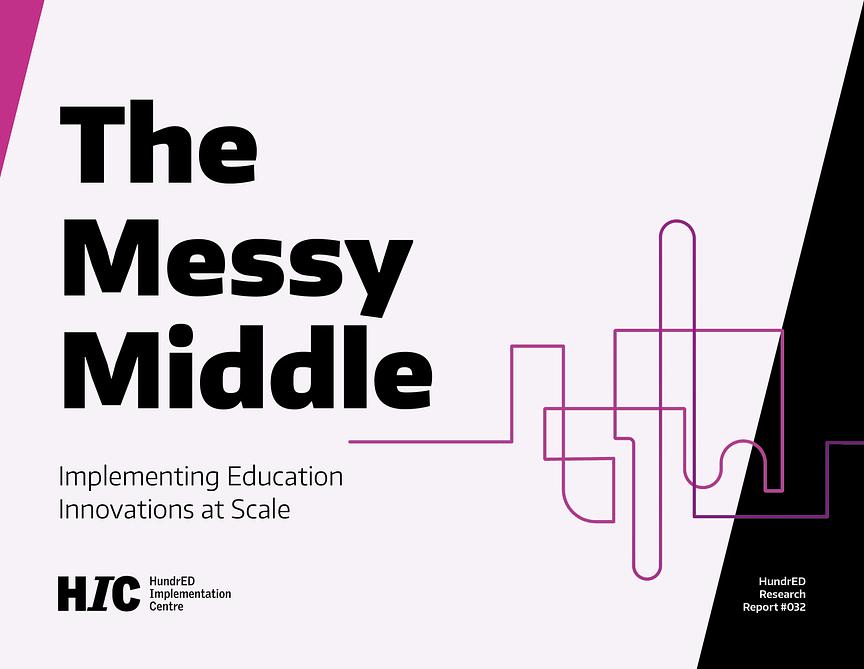Belsky, Scott. The Messy Middle: Finding Your Way Through the Hardest and Most Crucial Part of
Any Bold Project or New Venture. New York: Portfolio/Penguin, 2018.
Bergman, Eyal. Unlocking the “How”: Designing Family Engagement Strategies that Lead to School Success. Learning Heros, 2022.
Brookings CUE, Educate!, MSI, Pratham, STiR Education & VVOB. Education Scalability Checklist.
2021. https://www.vvob.org/en/news/education-scalability-checklist-resources.
Bryk, Anthony S. and Schneider, Barbara L. Trust in Schools: A Core Resource for Improvement. New York, NY: Russell Sage Foundation, 2002.
Curtiss Wyss, Molly, Elliott, Maya, Perlman Robinson, Jenny, Qargha, Ghulam Omar. Scaling impact in education for transformative change: Practical recommendations from the Real-Time Scaling Labs.
The Brookings Institution, 2023. Davies, Anna and Simon, Julie. “How to Grow Social Innovation: A Review and Critique of Scaling and Diffusion for Understanding the Growth of Social Innovation.” Paper prepared for the 5th International Social Innovation Research Conference, Oxford, The Young Foundation, 2-4 September 2013.
Fasana, Guglielmo, Tournier, Barbara and Jones, Charlotte. “Why Should We Invest in the Middle Tier for Improved Teaching and Learning?” 2010 UKFIET Conference, UKFIET, The Education and Development Forum, October 18, 2021.
Fullan, Michael and Gallagher, Mary Jean. The Devil is in the Details: System Solutions for Equity, Excellence, and Student Wellbeing. Corwyn, 2020.
Gargani, John and McLean, Robert. “Scaling Science.” Stanford Social Innovation Review (Fall 2017), https://ssir.org/articles/entry/scaling_science.
Green, Crystal, Mynhier, Laurelyn, Banfill, Jonathan, Edwards, Phillip, Kim, Jungwon and Desjardins, Richard. “Preparing education for the crises of tomorrow: A framework for adaptability.” International Review of Education 66 (2020), 857–879. https://doi.org/10.1007/s11159-020-09878-3.
Green, Crystal and Ziegler, Lauren. Implement at Scale: An Agenda for Education Innovation Implementation Research. Helsinki: HundrED, 2023. https://hundred.org/en/reports/implement-at-scale.
Hatch, Thomas. “We will now resume our regular programming.” Journal of Educational Change, 22 (2021): 447-456. https://doi.org/10.1007/s10833-021-09434-2.
Hatch, Thomas with Corson, Jordan and van den Berg, Sarah Gerth. The education we need for a future we can’t predict. Thousand Oaks, CA: Corwin, 2021.
Horrowitz, Ben. The Hard Thing About Hard Things. Harper Business, 2014.
Howells, Jeremy. “Intermediation and the role of intermediaries in innovation.” Research policy 35, no. 5 (2006): 715-728.
Jhunjhunwala, Parnika and Benjamin Kumpf. “OECD Scaling Learning Journeys Series: Scaling Innovation, Scaling Development Outcomes.” 7 Sept 2022 https://www.idiainnovation.org/resources/oecd-scaling-learning-journeys-series-scaling-innovation-scaling-development-outcomes
Lockton, Marie, Caduff, Anita, Daly, Alan J. and Rehm, Martin. “Beyond Knowledge Brokers: Uncovering Resource Architects in Knowledge Mobilization.” SOSNetLab, 2023. https://sosnetlab.com/static/papers/resource_architects_2023.pdf.
HundrED. “Colors of Kindness.” https://hundred.org/en/innovations/colors-of-kindnes.
HundrED. “HundrED Research.” https://hundred.org/en/research.
HundrED. “Rainbow of Education.” https://hundred.org/en/innovations/rainbow-of-education.
HundrED. “Sir Ken Robinson Compares Human Organisations to Organisms: Education Is A Dynamic System.” April 3, 2017. https://hundred.org/en/articles/5-sir-ken-robinson-compares-human-organisations-to-organisms-education-is-a-dynamic-system.
Jhunjhunwala, Parnika and Kumpf, Benjamin. “OECD Scaling Learning Journeys Series: Scaling Innovation, Scaling Development Outcomes.” International Development Innovation Alliance, 2022. https://www.idiainnovation.org/resources/oecd-scaling-learning-journeys-series-scaling-innovation-scaling-development-outcomes.
Leponiemi, Lasse, Ruoho, Noora, and Tuominen, Saku. Development of an Innovation-Friendly Education System. HundrED Research, 2020. https://hundred.org/en/research.
Leponiemi, Lasse. Innovators Funding Needs For Education Innovations - What kind of funding is needed for scaling up education innovations? HundrED Research, 2019. https://hundred.org/en/research.
Lundblad, Jennifer P. “A Review and Critique of Rogers’ Diffusion of Innovation Theory as it Applies to Organizations.” Organization Development Journal 21, no. 4 (Winter 2003): 50-64.
McClure, Dan. “Scaling: Innovation’s Missing Middle.” Thoughtworks (blog). March 13, 2015. https://www.thoughtworks.com/en-us/insights/blog/scaling-innovations-missing-middle.
McLean, Robert and Gargani, John. Scaling impact: innovation for the public good. Routledge, 2019.
Moore, Michele-Lee, Riddell, Darcy and Vocisano, Dana. “Scaling Out, Scaling Up, Scaling Deep: Strategies of Non-profits in Advancing Systemic Social Innovation.” The Journal of Corporate Citizenship, no. 58 (June 2015): 67-84.
Morris, Emily and Cheng, Yu-Ling. Parents as Allies Partnership: Innovative Strategies for (Re)imagining Family-School-Community Engagement. (2023, forthcoming).
Morris, Emily Markovich and Winthrop, Rebecca. “Let’s Talk: Starting Conversations with Parents and Teachers on their Beliefs in Education.” International Journal about Parents in Education, 13 (2023). https://doi.org/10.54195/ijpe.16408
Murray, Robin, Caulier-Grice, Julie and Mulgan, Geoff. The Open Book of Social Innovation. London: NESTA and the Young Foundation, 2010.
Muskin, Joshua. “Strengthening teacher capacity: What do we really mean?” IIEP Learning Portal (blog), UNESCO, 2018. https://learningportal.iiep.unesco.org/en/blog/strengthening-teacher-capacity-what-do-we-really-mean.
NESTA. Making it Big: Strategies for Scaling Social Innovations. London: NESTA, 2014.
Oberai, Himani, and Anand, Ila Mehrotra. “Unconscious bias: thinking without thinking,” Human Resource Management International Digest, 2018, https://doi.org/10.1108/HRMID-05-2018-0102.
Orton, Kristann. “Desirability, Feasibility, Viability: The Sweet Spot for Innovation,” Innovation Sweet Spot (blog), Medium, 2017. https://medium.com/innovation-sweet-spot/desirability-feasibility-viability-the-sweet-spot-for-innovation-d7946de2183c.
Petrie, Chris, Lasse, Leponiemi, Tuominen, Saku, and Spencer-Keyse, Jessica. Schools that Learn. HundrED Research, 2020. https://hundred.org/en/research.
Rizvi, Fazal, and Bob Lingard. Globalizing education policy. Routledge, 2009.
Rogers, Everett M.. Diffusion of Innovations, 5th ed. New York: Free Press, 2003.
Sen, Amartya. Development as Freedom. New York: Anchor Books, 1999.
VVOB. Moving education innovations from pilot to scale. Technical Brief No. 6. Brussels, Belgium: VVOB, 2021. https://www.vvob.org/en/downloads/technical-brief-6-moving-education-innovations-pilot-scale.
Winthrop, Rebecca, Barton, Adam, Ershadi, Masha, and Ziegler, Lauren. Collaborating to Transform and Improve Education Systems: A Playbook for Family-School Engagement. The Brookings Institution, 2021. www.brookings.edu/familyengagement
Winthrop, Rebecca, Ziegler, Lauren, and Ershadi, Mahsa. “Conversation Starter Tools.” The Brookings Institution, 2021. www.brookings.edu/familyengagement
